- Home
- Claudia Mills
Fourth-Grade Disasters Page 4
Fourth-Grade Disasters Read online
Page 4
Coach Joe beamed. “You guys have really stepped up to the plate on this assignment, I can tell. Any questions? Any problems? Anyone stuck on base and can’t get home?”
One girl raised her hand. “Mine’s too short. I don’t know how to make it long.”
“Great question, great question,” Coach Joe said. “Here’s how you make a story longer. And better.”
He stood up and with a bright red marker wrote one word on the dry-erase board behind his stool: CONFLICT.
“Your main character has a problem, correct?” Coach Joe went on. “She solves it right away, end of story. So don’t have her solve it right away. Remember the old saying, ‘If at first you don’t succeed, try, try, again’? That’s good advice for writing our stories. Don’t let your character at first succeed. Have her try, and fail. Try, and fail. And then, try and succeed.”
Mason thought about Pedro the piano. Pedro could break one of his strings. Then the piano tuner would come and fix it. Pedro could spill something on his keys. Then the music teacher would clean it. Then Pedro could just refuse to play.
He thought about Mason the boy. Mason started out refusing to join the Platters. Then his mother made him join. Mason hid in the second row and lip-synched. Then Dunk shoved him off the riser, and Mrs. Morengo made him stand in the front row next to Brody. Mason had his hideous coughing spasm during his private singing. Then Mrs. Morengo said he should take voice lessons and have a solo in a concert, which would be like singing all by himself in front of Mrs. Morengo and his classmates but a hundred thousand times worse.
Now Mason could—? Now Mason could what?
He leaned over and whispered to Nora, “Does your hundred-dollar bill have a problem?”
“No,” she whispered back. “You can’t have a problem unless you have thoughts and feelings. Well, I guess you could have a problem, but you wouldn’t know you did, so you wouldn’t care.”
That was one of the many ways Mason was different from a hundred-dollar bill.
Mason knew he had a problem.
And Mason cared.
6
Saturday morning, Mason and Dog left early for a walk. On school days, it was all Mason could do to force himself out of bed, but on weekend mornings he found himself wide awake while his parents were still sleeping. And these days, the instant he was awake, Dog was awake, too.
That was one of the many satisfying things about Dog.
There was no visible activity yet at Brody’s house. Mason knew that Brody had a soccer game later that morning and an afternoon playdate with his fourth-best friend, Alastair. Mason’s mother had mentioned something at dinner last night about taking Mason to see a Japanese puppet version of Peter and the Wolf.
Mason didn’t think he could face Japanese puppets after a whole week of being in the Plainfield Platters. He needed an alternative plan, and he knew his mom wouldn’t think watching cartoons with Dog counted.
What Mason really needed was a second-best friend of his own.
Dog stopped to pee. Mason never ceased to be impressed at how Dog could balance so easily on his two left legs while lifting his only right leg. This was another of the many satisfying things about Dog.
Mason could probably share one of Brody’s other friends, the way they shared Dog. Sometimes Mason did join Brody and Sheng or Julio when they went to a movie, or bowling.
Still, if Mason had to have a second-best friend, the person he liked best, after Brody, was Nora. Nora was sensible. She had good ideas. Once last summer she had even come over to Mason’s house and helped Mason and Brody give Dog a bath.
Or, rather, Mason and Brody had helped Nora give Dog a bath.
Or, rather, Brody had helped Nora give Dog a bath.
Should Mason call Nora on the telephone? What would he say? Do you want to hang out this afternoon so I won’t have to go with my parents to see a Japanese puppet version of Peter and the Wolf?
Actually, when he tried out the line in his head, it sounded pretty good.
Or he could say: Do you want to hang out with Dog and me for a while?
That sounded pretty good, too.
Breakfast was plain Cheerios and milk for Mason, tofu-and-red-pepper scramble for his parents. Mason hadn’t given the piece of paper with the voice teacher’s name and number to his parents. He had stuck it at the bottom of a pile of papers on his desk in his bedroom. It wasn’t as if Mrs. Morengo were going to call to talk to his parents about it.
Or at least he desperately hoped that she wasn’t.
After breakfast, Mason took the phone and the Plainfield Elementary directory up to his room. Dog watched him approvingly as he dialed Nora’s number.
“Hi, Nora. It’s Mason,” he said when she answered. “Mason Dixon. From school.”
“You’re the only Mason Dixon I know,” Nora said. “So you didn’t have to say ‘from school.’ ”
There was an awkward pause.
“Dog and I were wondering if you wanted to hang out with us this afternoon.”
“Sure,” Nora said. “Do you want to come to my house? Like, at two o’clock? I can show you my ant farm.”
“Sure,” Mason said. “Can Dog come, too?”
“Sure.”
Mason would never have guessed that finding a second-best friend could be so easy.
“Oh, Mason!” his mother said when he told her his plans for the afternoon. The visible delight on her face was a bit hard to take. He could only imagine how thrilled she would have been if he had told her about the voice teacher. “This will be so good for you! I told you fourth grade was going to be your best year, didn’t I?”
“Mom!” Mason said.
He didn’t know what she was making such a big fuss about. He was hardly the first boy in the history of the world to go over to a girl’s house to see her ant farm.
At two o’clock sharp, Mason knocked on Nora’s door. She lived just a few blocks away, so he and Dog had walked there by themselves.
Nora’s dad answered the door. Mason had met him before, last summer at art camp. Like Nora, he was tall and thin and serious-looking.
“Nora!” he called upstairs. “Dog is here! And Mason, too.”
Nora petted Dog and let him lick her in his friendly way. Then she led them up the stairs to her neat, orderly room. Mason started to feel more relaxed. His own room was also neat and orderly.
On one wall of Nora’s room hung a big map of the night sky: the northern and southern hemispheres with all their constellations. On another wall hung a big chart of some kind.
“The periodic table of the elements,” Nora told him. “You know—hydrogen, helium, lithium, beryllium.”
Mason didn’t know, but he nodded, anyway.
A tall, thin glass rectangle, filled with what looked like tunneled dirt, sat on a low table. From across the room, Mason couldn’t see any ants in it. But it had to be Nora’s ant farm.
“Yes,” Nora said, reading the question in Mason’s eyes. “Come meet my ants.”
Sure enough, when Mason drew closer, he could see dozens of ants, busily scurrying. Some were digging. Some were carrying things. They all seemed to know what they were doing.
As Mason watched, Nora lifted off the cover, reached in with a stick, and made a hole in one of the tunnel walls, so that dirt tumbled down, blocking the passageway. Almost instantly, the ants leaped into action to repair it.
Mason felt sorry for them. “Wasn’t that kind of mean? To make them do all that extra work?”
Nora stared at him. “Work is what ants do.”
“But do they like doing it?”
Nora replaced the ant farm cover. “It’s what they do,” she repeated. “It’s not a question of like or not like.”
Mason had to ask her one more thing. “How come you’re in the Plainfield Platters when you don’t like to sing?”
“What makes you think I don’t like to sing?”
“You don’t open your mouth very wide when you do it.”
&nb
sp; Nora laughed. Then, as if to answer Mason’s question, she said, “Everybody’s in the Platters.”
Her eyes fell fondly again on her ant farm; Mason followed her gaze. All the ants were doing their little ant jobs, none of them complaining or refusing to cooperate.
“But everybody doesn’t have to be in the Platters,” Mason said.
Nora thought about that for a moment. “No,” she said.
“It’s not like gravity, where everything has to fall down instead of up,” Mason went on.
“No,” Nora agreed. “It’s more like falling up would be too much trouble.”
They both laughed, but the fact remained: being in the Platters was trouble, too.
During Monday morning’s writing huddle, Coach Joe asked the class if anybody was ready to read his or her story aloud.
One hand, and only one, shot into the air.
“Brody,” Coach Joe said. “Thanks for being willing to share.”
Dunk groaned.
“Team,” Coach Joe said in a low, pleasant voice that was more effective in enforcing good behavior than Mrs. Prindle’s shrill scolding had ever been. “Okay, Brody, let’s hear what you have for us.”
“My story,” Brody announced, “is about a can opener named Clarence.”
Brody began to read. “Once upon a time there was a little can opener named Clarence. And once upon a time there was a huge, enormous, gigantic can. The can was filled with sauerkraut.” Brody looked up from his paper. “You know, to put on hot dogs. Some people don’t like sauerkraut on hot dogs. But I do.”
“What happened next?” Coach Joe prompted gently.
“Clarence worked at a hot-dog stand at the baseball stadium. He opened cans during every game. Cans of ketchup, cans of mustard, cans of relish, cans of sauerkraut.”
“Ketchup and mustard don’t come in cans,” Nora whispered to Mason. “They come in jars or bottles.”
Brody heard her. “Well, they might come in cans.”
“Let’s let Brody finish reading,” Coach Joe said. “Then we can give him our suggestions and comments at the end.”
“I’m almost to the exciting part,” Brody said. “Okay. One day the king and queen came to the baseball game.”
Mason knew Nora must want to ask what country this was that had kings and queens, and baseball and hot dogs. He was wondering that himself.
“The king really wanted a hot dog. He had never had a hot dog before, and this was his chance. And he wanted his hot dog with everything on it. So Clarence had to open the huge, enormous, gigantic can of sauerkraut all by himself. While the king was waiting.”
Brody paused again to draw out the suspense.
“Have you ever tried to open a really big can with a really little can opener?” he asked the class. “It’s hard. It takes forever. Another can opener would have given up. But not Clarence. ‘I think I can, I think I can, I think I can,’ Clarence said to himself. And the can got opened!”
Brody beamed at his classmates.
“The end?” somebody asked.
“No. Then the king ate the hot dog and liked it so much that he invited Clarence to come live with him and the queen in their palace and be the royal can opener. And he lived happily ever after.”
Coach Joe led the class in applause.
“Any comments for Brody? Remember, we always start with something positive.”
“It was funny,” Sheng said.
“What part was funny?” asked Coach Joe.
“Having him be a can opener. And calling him Clarence. And having a can opener say, ‘I think I can.’ ”
“Any suggestions for things Brody can think about as he revises his story?”
A girl named Emily raised her hand. “Clarence didn’t try and fail, and try and fail, and then succeed, the way you said. He just tried and succeeded right away.”
“Good point,” Coach Joe said. “Brody, do you think there might be some way Clarence could try to open the can and fail the first time?”
Brody thought for a moment. “He could fall off the can.”
Everyone laughed.
“Good! I bet he falls off and gets right back on again. That sounds like Clarence, doesn’t it, team?”
It sounded like Brody, too.
But what if Clarence the can opener didn’t want to open cans in front of people, the way Pedro the piano didn’t want to play in front of people? Then Clarence could fall off the can and lie peacefully on the counter for a nice long while until everyone decided to leave him alone and not make him open any cans ever again.
That was the story Mason would have written, if he had been writing a story about Clarence the can opener.
7
At Platters practice on Tuesday, Mrs. Morengo finished hearing the rest of the fourth graders do their solo singing. Mason wondered if she told any other kids that they should be taking voice lessons, or if he was the only one.
The first half of the fourth-grade alphabet, those who had done their solo singing for her already, joined the fifth graders in the gym with Mr. Griffith, who was teaching them a new song about raindrops.
Mason thought the raindrop song might be the single dumbest song he had ever heard. There were no words at all, no real words, just “Drip, drop, drip, drop.” The children were to start off singing quietly and slowly, to sound like the first raindrops falling at the beginning of a summer storm. As the song went along, the drips and drops came faster and faster, louder and louder—a downpour! Some of the fifth graders were assigned to bang cymbals and drums to represent deafening claps of thunder. Then, after the big storm was over, the song ended with just a few scattered voices singing “drip” and “drop.” The song ended with one last, final, tiny “drip.”
Mason wondered if he would prefer banging the cymbals to singing. He decided that, for all its faults, singing was less risky.
“Drip! Drop!” the Platters sang. “Drip, drip, drip, drip, drop!”
“Drip! Drop!” Mason mouthed. Even mouthing the words, it was easy to get the drips and drops mixed up. But probably it didn’t matter very much, either way.
Following the Pledge of Allegiance on Wednesday, the principal herself began reading the morning announcements. This was unusual: after the first week of school, the pledge and announcements were always read by kids from different classes.
Mason had had to read them once, back in second grade. He had stumbled over the words of the pledge, even though they were written in big print on a large sheet of paper. Instead of “republic,” he had said “peerublic,” and Mrs. Prindle thought he had done it on purpose to be funny. As if! That had been, even for second grade in Mrs. Prindle’s class, an unusually terrible day.
“Boys and girls!” Mrs. Miller’s voice came over the PA system. “I have some exciting news to share with all of you!”
Mason’s ears perked up. Was school going to close early?
“We have just received word that our school, our very own Plainfield Elementary, has been chosen for a wonderful honor. We have been picked as one of only five schools in the entire state of Colorado to be named a Beulah Brighton Belvedere School for the Arts!”
Whatever a Beulah Brighton Belvedere School for the Arts was, she sounded extremely excited about it. Mason started to tune out as she blabbed on about Plainfield’s all-school art show, fifth-grade handbell choir that had played last year at the state capitol, and “of course, our beloved Plainfield Platters!”
Mason started thinking about Dog, who was in trouble for chewing the trunk off his mother’s hand-knit elephant pillow. An elephant without a trunk wasn’t much of an elephant. Dog had looked ashamed when he was scolded, but Mason didn’t know if Dog really understood what he had done that was so terrible. Mason and Brody were going to play extra games of fetch with Dog after school today to see if that would help Dog break his new bad habit.
“I know I’ll see all of you at the special celebration concert next Friday!” he heard Mrs. Miller say.
Ma
son had missed something. Was there going to be a concert next week? Were the Platters singing in it? But Mrs. Miller had finished speaking.
He looked over at Brody, who flashed him an excited grin. An excited grin from someone who was always excited wasn’t very informative.
As they opened their math books to work on division, Mason whispered to Brody, “What did she say?”
“We’re singing! Next week! On TV!”
That couldn’t be right—not the part about singing on TV. But it could be true that the very first Platters concert was barely more than a week away.
Was that good news or bad news? Mason’s mother had said he had to be in the Platters for three months, until the first concert. Would this count as the first concert, the concert that would free him forever from being in the Platters? Or would he have to stay in the Platters for three months anyway, and sing in not one but two concerts?
He asked her that night at supper. His parents were eating a suspicious-looking Greek casserole made out of eggplant, called moussaka; Mason was eating a grilled cheese sandwich. They had already read the flyer sent home about the great honor awarded to Plainfield Elementary.
“Mom, if the Platters are having a special concert next week, does that mean that my fair try will be over and I can quit?”
She looked so sad at the question that Mason was almost sorry he had asked it. But then again, she didn’t seem to mind that he had the sadness of being pushed off the risers by Dunk, and the sadness of being overcome with a coughing fit during his “Puff” solo, and the sadness of having to pretend to sing a song about dripping and dropping raindrops.
“Oh, honey,” she said. “I thought you were starting to like being in the Platters.”
What possible reason could she have had for thinking that?
She looked over at Mason’s father, who suddenly had his mouth stuffed with an unusually large forkful of moussaka.
“What do you think, Dan? Less than three weeks just doesn’t seem very long to me, to be in the Platters.”
Well, his mother wasn’t in the Platters!
“What if the concert is horrible?” Mason demanded.

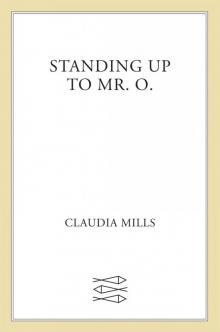 Standing Up to Mr. O.
Standing Up to Mr. O.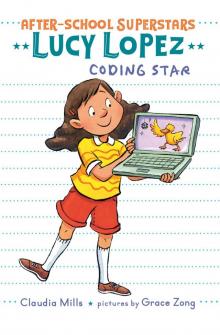 Lucy Lopez
Lucy Lopez Dinah Forever
Dinah Forever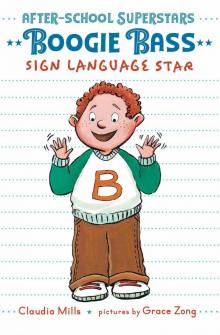 Boogie Bass, Sign Language Star
Boogie Bass, Sign Language Star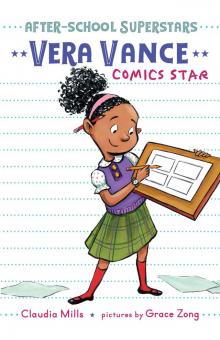 Vera Vance: Comics Star
Vera Vance: Comics Star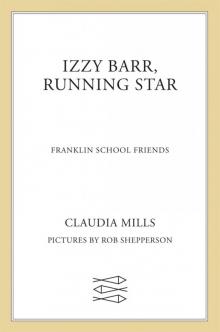 Izzy Barr, Running Star
Izzy Barr, Running Star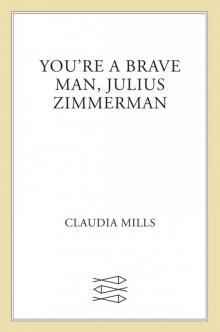 You're a Brave Man, Julius Zimmerman
You're a Brave Man, Julius Zimmerman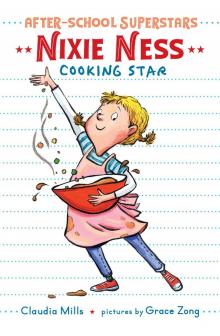 Nixie Ness
Nixie Ness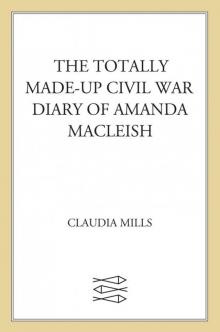 The Totally Made-up Civil War Diary of Amanda MacLeish
The Totally Made-up Civil War Diary of Amanda MacLeish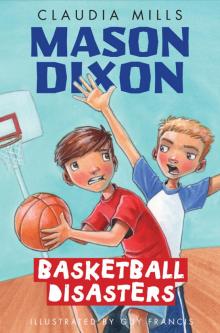 Basketball Disasters
Basketball Disasters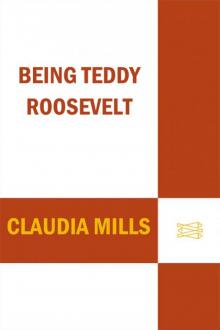 Being Teddy Roosevelt
Being Teddy Roosevelt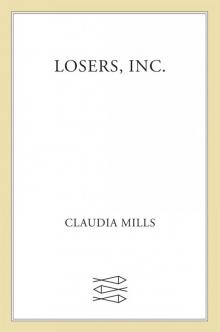 Losers, Inc.
Losers, Inc.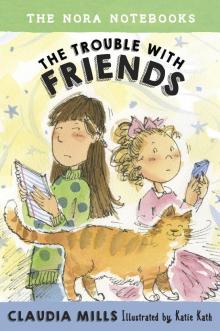 The Trouble with Friends
The Trouble with Friends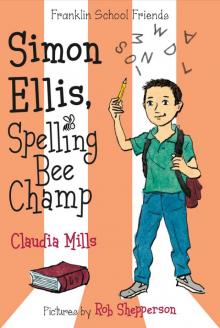 Simon Ellis, Spelling Bee Champ
Simon Ellis, Spelling Bee Champ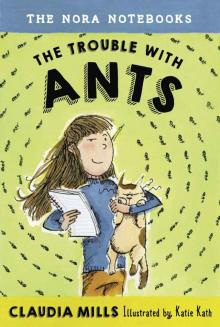 The Nora Notebooks, Book 1: The Trouble with Ants
The Nora Notebooks, Book 1: The Trouble with Ants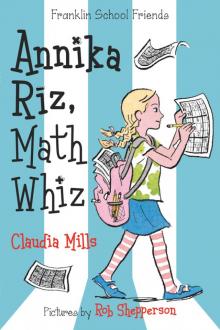 Annika Riz, Math Whiz
Annika Riz, Math Whiz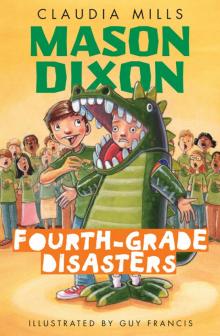 Fourth-Grade Disasters
Fourth-Grade Disasters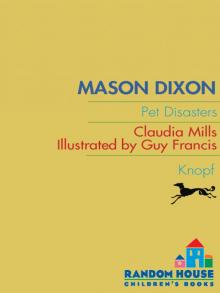 Pet Disasters
Pet Disasters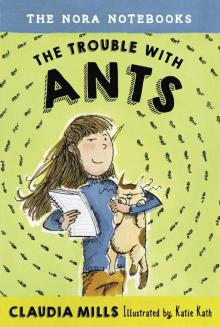 The Trouble with Ants
The Trouble with Ants Write This Down
Write This Down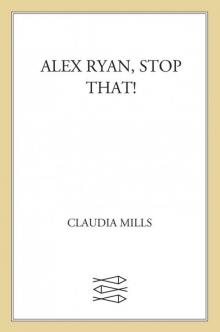 Alex Ryan, Stop That!
Alex Ryan, Stop That!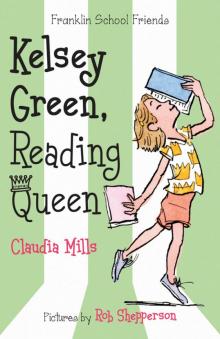 Kelsey Green, Reading Queen
Kelsey Green, Reading Queen How Oliver Olson Changed the World
How Oliver Olson Changed the World Lizzie At Last
Lizzie At Last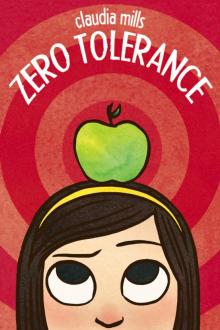 Zero Tolerance
Zero Tolerance The Nora Notebooks, Book 2
The Nora Notebooks, Book 2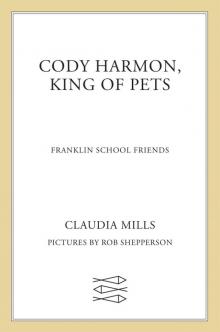 Cody Harmon, King of Pets
Cody Harmon, King of Pets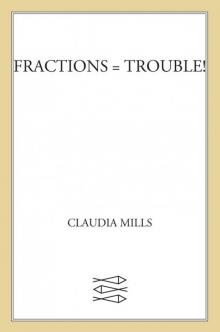 Fractions = Trouble!
Fractions = Trouble! Makeovers by Marcia
Makeovers by Marcia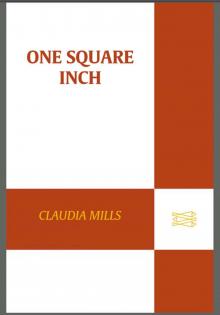 One Square Inch
One Square Inch